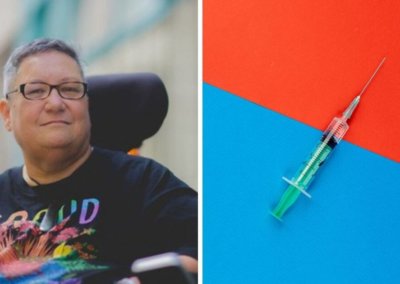A woman in New Zealand has called for the country’s euthanasia law to be expanded to those who are not terminally ill, only two years after euthanasia was introduced.
Nicole Martin suffers from a rare disease called Ehlers-Danlos Syndrome (EDS) and has described her experiences of daily joint dislocations and constant pain that began in her early thirties. She has said that her health has deteriorated over time, as well as her ability to engage with hobbies and enjoy her social life.
Under the current law in New Zealand, a person can end their life by assisted suicide or euthanasia if they are thought to have six months left to live. Now though, in an article for the New Zealand Herald, Ms Martin is pushing for a change to the End of Life Choice Act 2019 to allow people like her, who are not terminally ill, to end their own lives.
Nicole previously wrote a resource for the Ehlers-Danlos Syndromes New Zealand group titled “Stay Sane with Chronic Pain”, which shares strategies for supporting mental health in the midst of chronic pain. The group’s website also highlights multiple articles about EDS, including many regarding medical professionals’ lack of awareness and poor treatment of the condition.
However, she is now speaking out in favour of changing the law to allow those without a terminal diagnosis to end their lives.
Nicole’s husband originally wanted her to fight for life
Nicole said that “Over the years [my husband] witnessed the progression… for many years he wanted me to fight”. Nicole also shared that she wished to be treated in the same way as her pet dog had been when she was put down.
In the New Zealand Herald article, she said that people with degenerative illnesses may not be able to live a “fulfilling life” if they are bedridden and unable to see their friends and family.
An open letter written by doctors in 2023 claimed “In order to get the legislation through parliament, politicians were allowed to damage and weaken the text, removing the originally proposed “grievous and irremediable medical condition” clause thereby leaving only a “terminal illness likely to end the person’s life within 6 months”.
Their argument continued: “If the objective of legalising assisted dying as an end-of-life option was to relieve unbearable suffering that cannot otherwise be relieved, it has utterly failed these patients [with a range of serious diseases]”.
The letter also argued that the clauses preventing doctors from initiating discussions about assisted suicide and requiring patients to be mentally competent at the time of euthanasia should be removed from the legislation.
New Zealand was the first country in the world to introduce assisted suicide and euthanasia by popular vote
New Zealand became the first country in the world to introduce assisted suicide and euthanasia by popular vote in a binding referendum on 19 September 2020 and this came into force on 7 November 2021.
Polling at the time suggests that as many as 80% of voters were unclear about what they were voting for, thinking that the law would permit physicians to turn off life support. This, in fact, was already legal and not the subject of the referendum.
Spokesperson for Right to Life UK, Catherine Robinson, said “Euthanasia and assisted suicide have only been available in New Zealand for just over two years, and yet we are already starting to see attempts to reduce the safeguards put in place to protect the most vulnerable people”.
“Once suffering is seen as sufficient cause for a person to end their life with medical assistance, it becomes increasingly difficult to justify placing any limit on this principle, as seen in Canada with euthanasia for mental health and the Netherlands with child euthanasia”.
“New Zealand could soon be yet another example of the very slippery slope that is created when assistance in suicide is legalised. Canada dropped the requirement that assisted suicide and euthanasia be available only to those whose death was “reasonably foreseeable” in 2021, only five years after the legislation was initially introduced”.
“Hopefully, the legislators in New Zealand will have learned something from the disastrous experience in Canada and don’t expand the assisted suicide and euthanasia laws further”.












